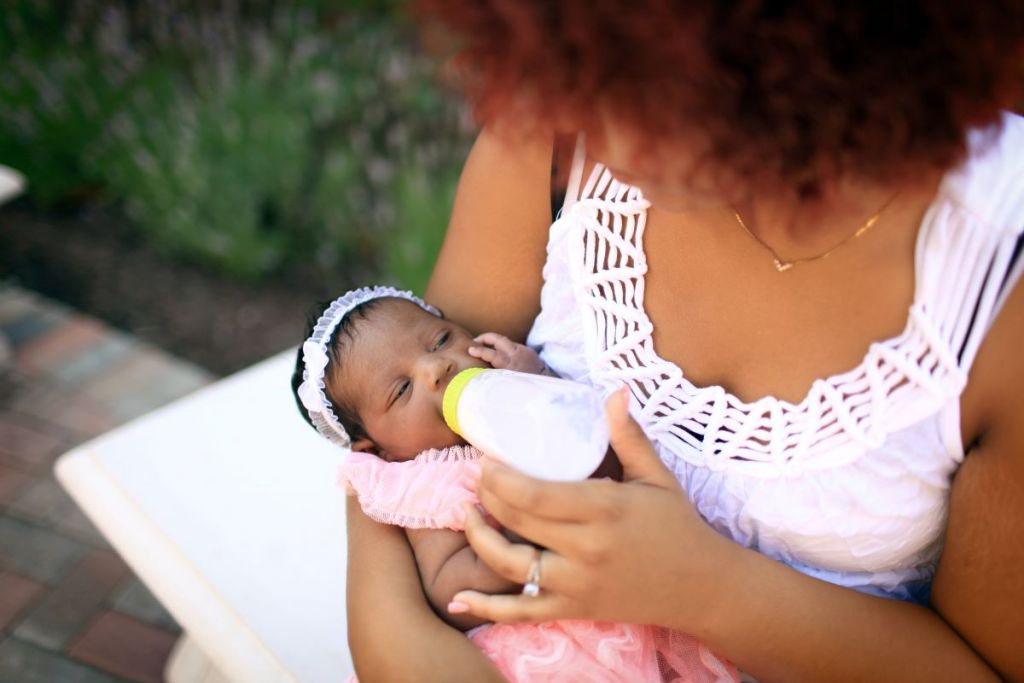
There are so many unexpected things that come with being a new mom, especially those early days home from the hospital. The list is lengthy, which is why some things like cluster feeding come as a surprise for parents adjusting to life with a newborn.
Parents-to-be have heard all the jokes about not getting a good night’s sleep once their newborn comes home, but what about cluster feeding? Don’t be surprised or worried if you haven’t heard the term. We’ve got everything you need to know about cluster feeding and what to expect if you experience it.

Understanding cluster feeding
A cluster is defined in the dictionary as occurrences happening close together. When it comes to cluster feeding with an infant, the action is described as multiple feedings in a shorter time span. In those first few days and weeks after birth, babies will typically need to be fed around the clock. The number of times an infant will feed in a 24-hour time period will, of course, vary, but the (CDC) advises an infant will feed around 8 to 12 times. This comes out to a feeding every two to three hours.
When an infant is cluster feeding, the amount of time between feedings is fleeting, with baby wanting to eat more often. Cluster feedings are typically followed by a longer block of sleep by the infant. Not all parents will have to deal with cluster feeding, and it’s not exclusive to breastfeeding babies. Cluster feeding can occur with bottle and breastfeeding infants. However, cluster feeding though can be harder on moms breastfeeding since their milk production might not necessarily be able to keep up with baby’s hunger cries. The important thing to remember is that cluster feeding is completely normal.
Doctors don’t completely understand why some babies cluster feed and others don’t, but moms shouldn’t immediately worry that baby isn’t getting enough milk. One of the theories as to why babies cluster feed has to do with a growth spurt, like when growing tweens and teens can’t seem to get enough to eat. Another theory has to do with cluster feeding mimicking babies’ routines in utero. Whatever the reason, if your infant is cluster feeding or you want to be prepared in the event your newborn does, here are the things you need to know about it.

What parents need to keep in mind about cluster feeding
Now that you know what cluster feeding is, you probably have more questions. So, let’s go over the basics of cluster feeding and what you can do to be prepared.
When does cluster feeding start?
There isn’t a set time frame for cluster feeding. It may begin shortly after baby comes home from the hospital or weeks and even months after. Cluster feedings can occur any time during the day, but most of the time; cluster feedings happen during the early evening or overnight hours.
When does cluster feeding stop?
The good news is cluster feeding does come in bunches, which is why doctors think it coincides with growth spurts. Cluster feedings may appear at the two to three-week mark, six weeks, three months, and/or six months. Remember, that not all infants will cluster feed and some may not do it on a consistent basis. A cycle of cluster feedings can last for multiple days.
Signs of cluster feeding
If you’re not sure if your infant is cluster feeding, here are some of the telltale indicators:
- Wanting to eat again shortly after a full feeding session
- Taking a long nap after cluster feeding
- Feeding in a cycle of short bursts
- Wanting to eat multiple times during the early evening and nighttime hours
How to handle cluster feeding
It can be tough to manage days of cluster feeding, especially for breastfeeding moms. So, it’s important to keep your strength up by eating healthy meals and staying hydrated. Take advantage of the times baby is sleeping by getting in a nap yourself. Naps aren’t always possible for busy moms, so ask for help if you need it from your partner, relatives, or friends when your baby is in the midst of cluster feeding.

Don’t try to stop cluster feeding
Cluster feeding may happen whether your little one is bottle or breastfeeding. While it may be extremely frustrating and exhausting, the one thing not to do is to force baby to get on a regular eating schedule. So don’t listen to your helpful relatives on this one. Babies cluster feed for a reason and trying to stop it will just leave you more deprived of sleep and anxious because you and baby will be very cranky.
Instead, keep track of your little one’s feedings if you suspect cluster feeding. Take note of your baby’s weight to make sure they are gaining, not losing. The American Academy of Pediatrics has very simple advice on how many times a day babies should eat — when they’re hungry. Cluster feeding also won’t last forever, even though it may seem like it when you’re in the midst of it.



